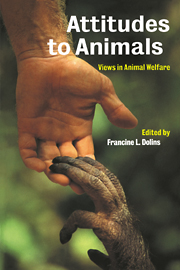Book contents
- Frontmatter
- Contents
- List of contributors
- Acknowledgements
- Part I Attitudes to animals
- Part II Animal awareness
- Part III Animal welfare
- Part IV Research and education
- Part V Epilogue: the future of wild animals
- 16 Human sentiment and the future of wildlife
- 17 In the absence of animals: power and impotence in our dealings with endangered animals
- Index
16 - Human sentiment and the future of wildlife
Published online by Cambridge University Press: 16 November 2009
- Frontmatter
- Contents
- List of contributors
- Acknowledgements
- Part I Attitudes to animals
- Part II Animal awareness
- Part III Animal welfare
- Part IV Research and education
- Part V Epilogue: the future of wild animals
- 16 Human sentiment and the future of wildlife
- 17 In the absence of animals: power and impotence in our dealings with endangered animals
- Index
Summary
How wildlife is to be managed in the future depends, in large part, on why it is thought important for wildlife to have a future. Someone who thinks in terms of the medical or photographic opportunities which wildlife provides is liable to advocate policies different from those of a person who appeals to ecological balance. People to whom the fates of individual animals matter are unlikely to pursue exactly the same policies as those for whom it is the species that really counts.
The management issue, then, turns on broadly moral considerations which are not the preserve of scientists and experts in the way that the implementation of proper policies may be.
Unfortunately, the blunt moral questions, ‘why ought there to be wildlife? why would it be wrong to allow its demise?’ have a certain intractability. To begin with, ‘wildlife’ is a vague term. Does it, for example, apply to the deer herds of Nara or Richmond Park? It is also a huge category, embracing several million species, some 50000 vertebrates included. It is not obvious that the demise of mussels or termites would be wrong for the same reasons as that of dolphins or leopards. Intractability is due most of all, however, to the immaturity of our moral thinking on such matters. There have always been individuals, from the Buddha to Bernard Shaw, concerned about our treatment of wild animals, but it is only with the recent massively visible threat to wildlife that serious efforts have been made to construct a ‘wild life ethic’ as an extension to that seasoned moral thinking whose compass, hitherto, has been human beings alone.
- Type
- Chapter
- Information
- Attitudes to AnimalsViews in Animal Welfare, pp. 231 - 243Publisher: Cambridge University PressPrint publication year: 1999
- 3
- Cited by



